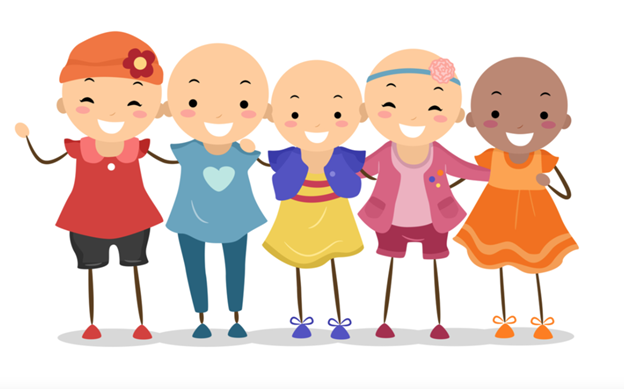Alopecia Areata is a common autoimmune disorder that often results in unpredictable hair loss. It affects roughly 2% of the population. In the majority of cases, hair falls out in small patches around the size of a quarter. For most people, the hair loss is nothing more than a few patches, though in some cases it can be more extreme. Sometimes, it can lead to the complete loss of hair on the scalp (alopecia totalis) or, in extreme cases, the entire body (alopecia universalis). The condition can affect anyone regardless of age or gender.
Below are ways you can talk about Alopecia Areata with children of various ages.
 You may have noticed that sometimes grown up men are bald or are missing hair on some places on top of their heads. This can happen to grown up women, too. When it happens in grown ups, it can be because baldness runs in the family or because their hair is thinning with age. Sometimes, not nearly as often, this can happen to kids and young people too for what seems like no reason at all. This is called alopecia.
You may have noticed that sometimes grown up men are bald or are missing hair on some places on top of their heads. This can happen to grown up women, too. When it happens in grown ups, it can be because baldness runs in the family or because their hair is thinning with age. Sometimes, not nearly as often, this can happen to kids and young people too for what seems like no reason at all. This is called alopecia.
There are different kinds of alopecia. Sometimes a person will just lose a little bit of hair on their head and other times they might lose all of their hair, even their eyebrows and eyelashes. There are some medicines that can help alopecia, but they don’t all always help, all of the time. It is ok to try the medicines or it is ok not to try the medicines. Sometimes the hair comes back all by itself.
Most of the time alopecia is something that can happen on its own, without the body having any other needs for medicine. But it is a good idea to see a doctor and have a check up when alopecia starts to make sure that the rest of the body is healthy and well.
One way to be a good friend to someone with alopecia, is to be kind to them when you see their hair changing and to let them talk to you about their hair or hair loss when they feel like it.
There are 3 different kinds of alopecia.
- Alopecia Areata is what it is called when a person just loses some hair in spots or patches.
- Alopecia Totalis is when a person loses all of the hair on their head.
- Alopecia Universalis is when they lose all of their hair: on their head, their eyebrows and eyelashes, even on their arms and legs.
Alopecia is no one’s fault. It’s just something that happens sometimes in some people’s bodies. Doctors think that alopecia comes from mixed signals in the immune system. The immune system is our body’s germ fighting team. The cells in our immune system work hard to fight and kill any germs (bacteria or viruses) that make it past our defense system inside our body.
But sometimes in some bodies, the immune system germ fighters can get a little confused about what things in our bodies are germs and what things are not. Doctors think that with alopecia, the immune system might be getting confused and treating some hair follicles (the little itty bitty tiny tunnels our hair grows from) like germs. They think this is because hair changes and grows really fast, like many germs.
If someone has alopecia, their doctor might ask them to have a blood test just to check that everything else in their immune system is going just right. There are some medicines that can help alopecia, but they don’t all always help, all of the time. It is ok to try the medicines or it is ok not to try the medicines. Sometimes the hair will grow back all on its own.
A kid dealing with alopecia might try wearing hats, wigs, wraps or other accessories. One way to be a good friend to someone with hair loss would be to be kind to them if they want to wear a hat, or a wig, or if they want to go without. Think about what things you are going to say or ask about their hair BEFORE you say them or ask them. Then you can decide how it might make you feel if you were in their shoes.
Sometimes the hair falls out in patches(Alopecia Areata). Sometimes all of the hair on the head falls out (Alopecia Totalis) and sometimes all of the hair on the entire body falls out (Alopecia Universalis). In the past, people used to blame stress or nervousness for hair loss. However, doctors have discovered through research that alopecia is not caused by stress. (After all, think of all of the stressed people you know with full heads of hair!) Alopecia is no one’s fault.
For some people that have alopecia, they may find that it gets worse when they are stressed, but that is true of many things that can act up in our bodies. (Eczema, cardiac issues, mental health disorders, blood pressure, for a few examples). There are different treatments that a dermatologist can prescribe to help with alopecia, but they all seem to work differently on different people.
Some people may choose not to treat their alopecia at all. That is ok too! It is something that each family needs to figure out for themselves. In addition to medicines, people dealing with alopecia may decide to wear wigs, hats or head wraps in order to protect their scalp or to achieve the style they want.
If they have Alopecia Areata they may decide to try some different cool hair dos that hide their bald patches or give them a cool asymmetrical hair style. All of these are ok and are healthy ways to cope with having alopecia.
One way you can be a good friend to someone with alopecia is to listen to them express how they are feeling about their hair loss, be supportive and be ready to learn. There are lots of things that the hairs on our body do that you might never have thought of! Someone dealing with alopecia universalis may have challenges with their eyes watering because they don’t have eyebrows and eyelashes to protect them from the elements, for example. Being aware of these challenges can help you to be kind and empathetic.
Source: achildrenshouse.org
